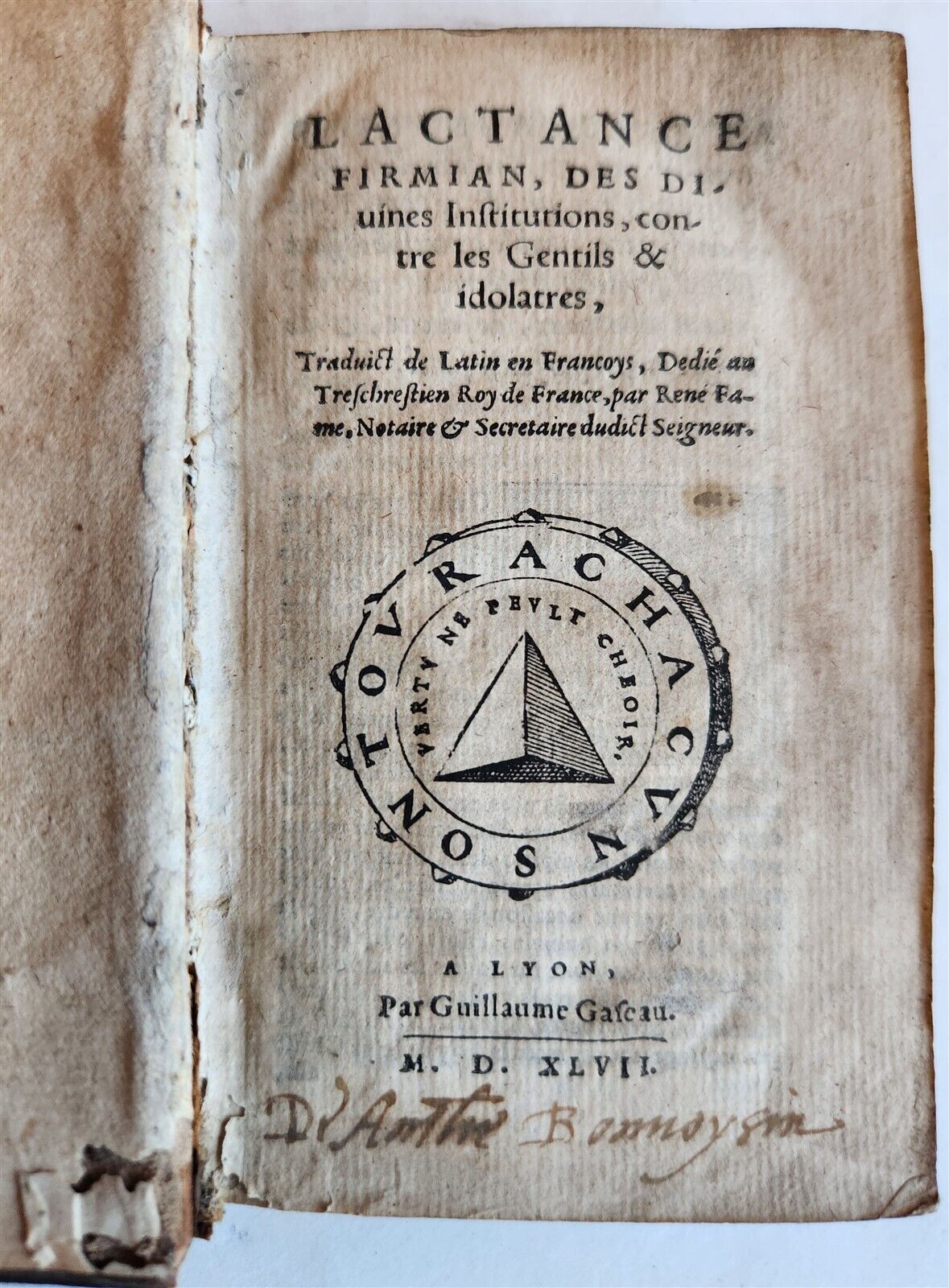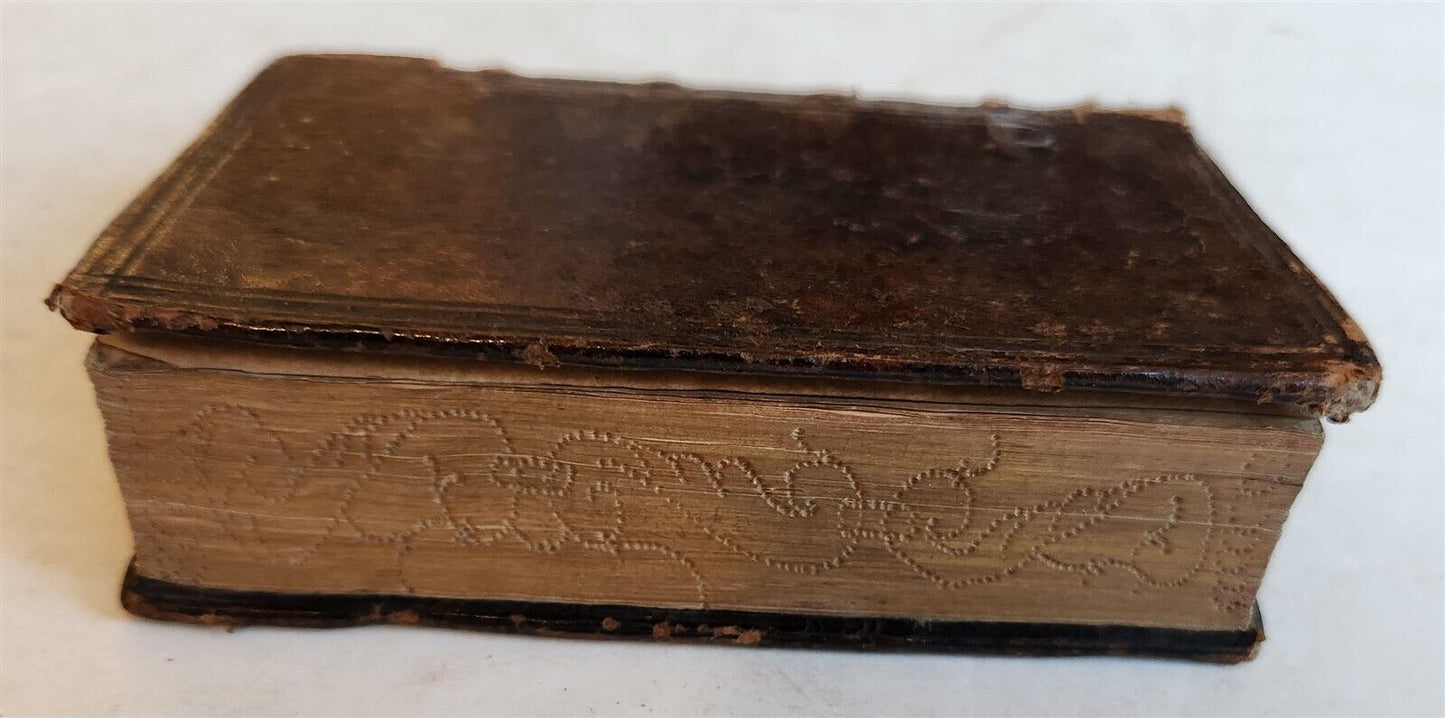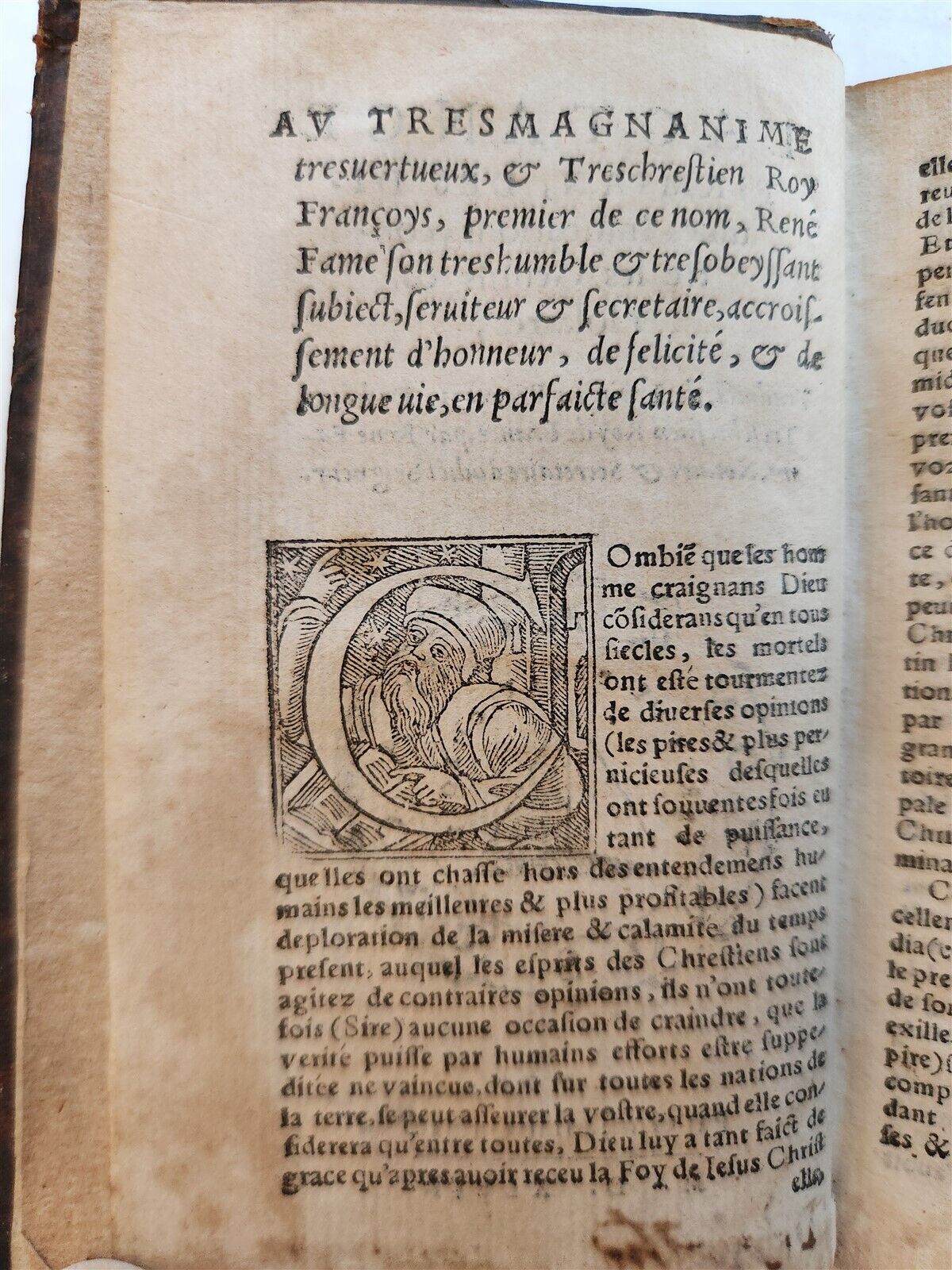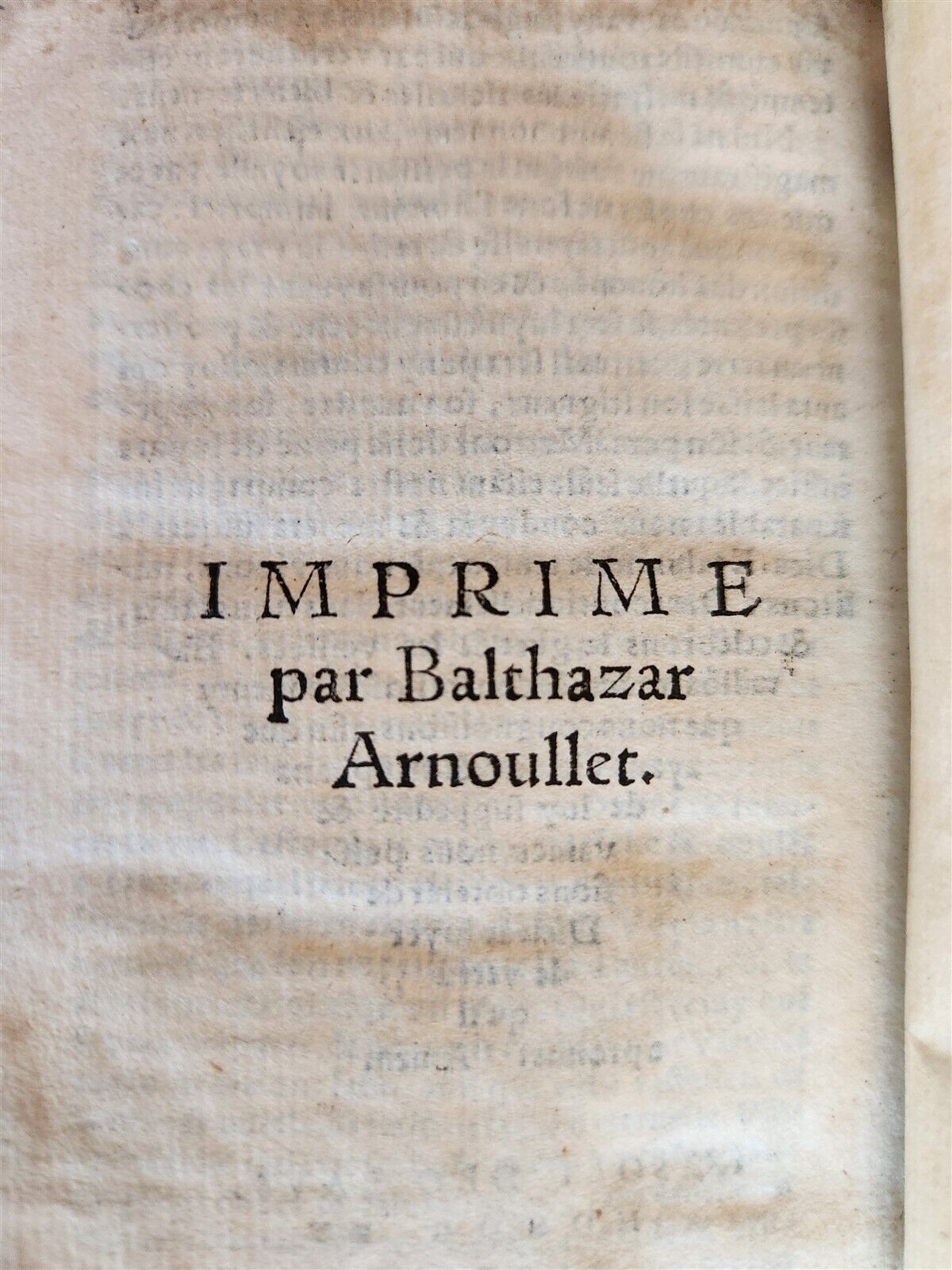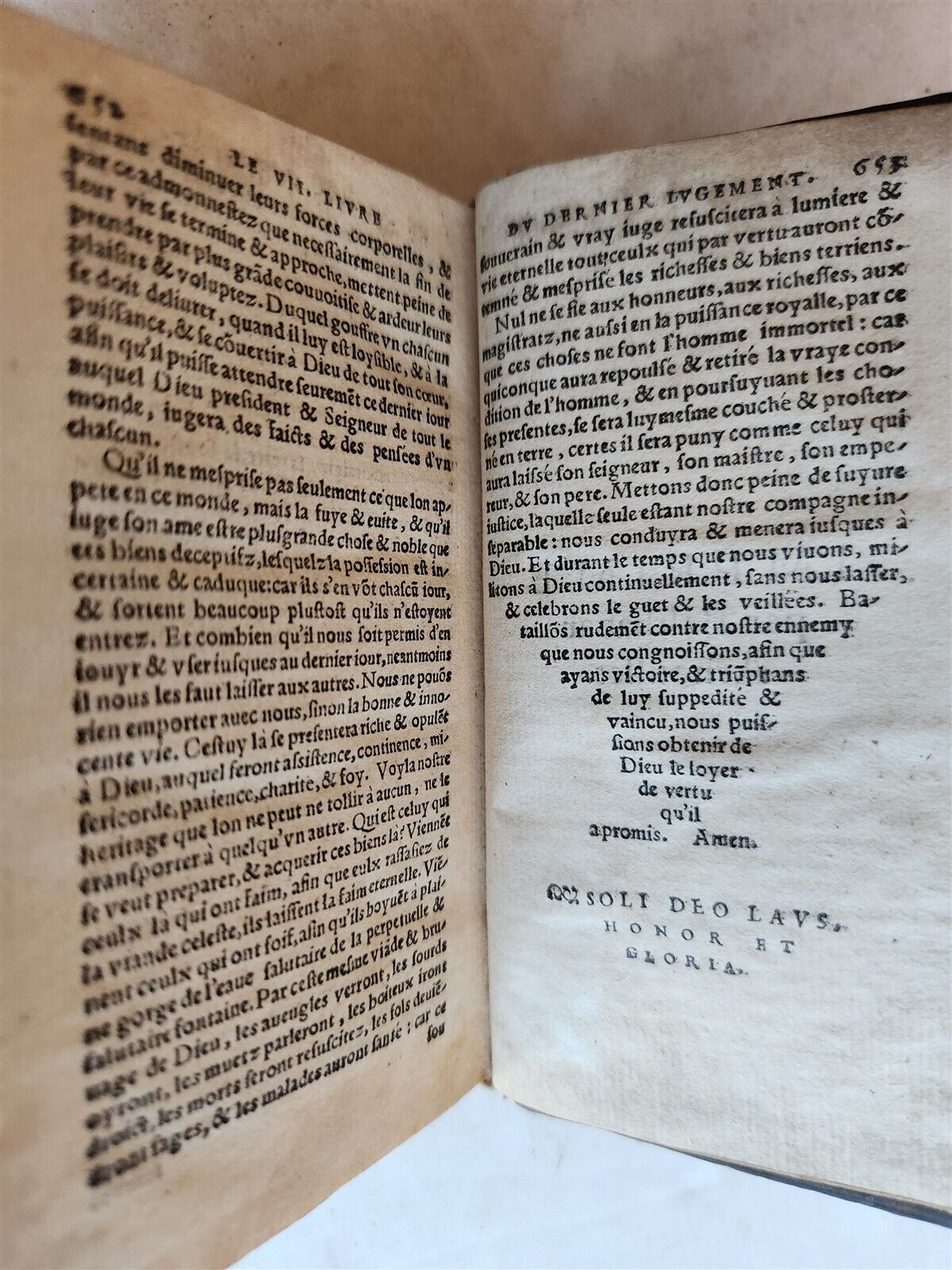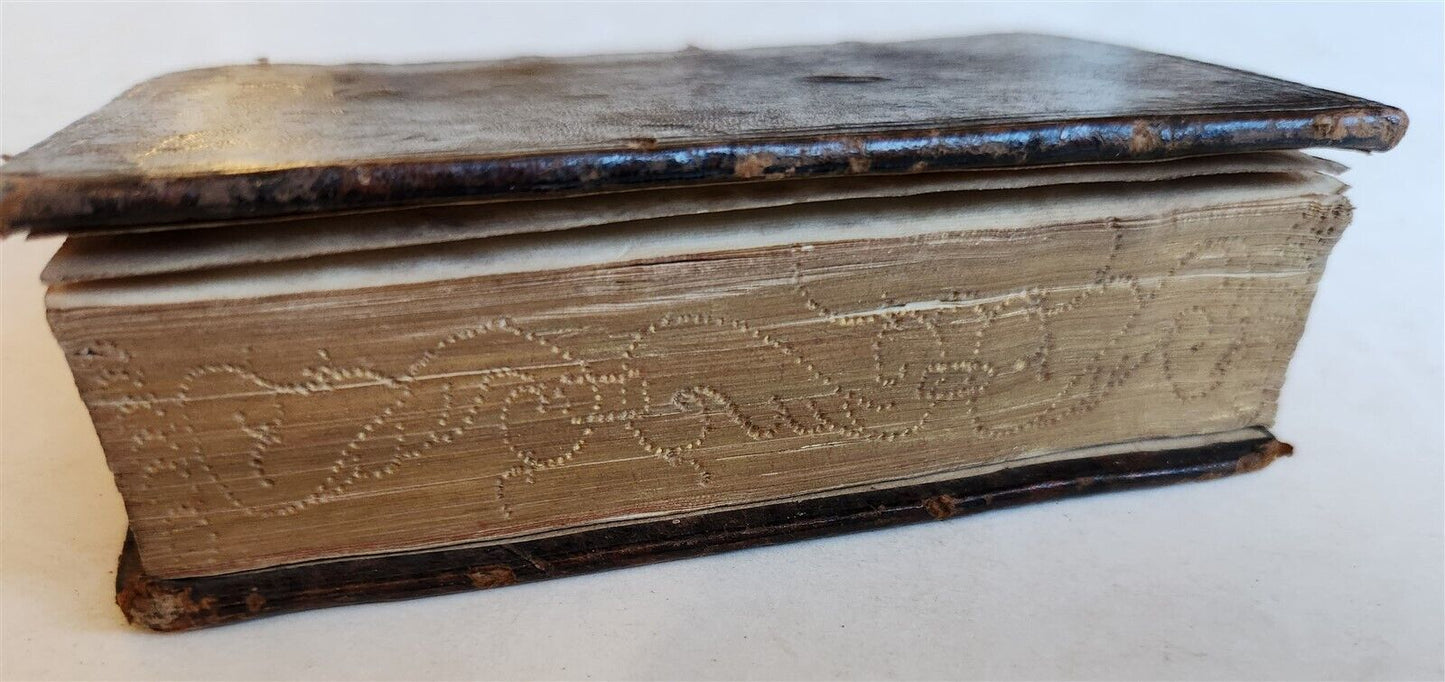Motka
1547 LACTANTIUS antique Des divines institutions contre les gentilz & idolatres
1547 LACTANTIUS antique Des divines institutions contre les gentilz & idolatres
Regular price
$449.40 USD
Regular price
$642.00 USD
Sale price
$449.40 USD
Unit price
per
Couldn't load pickup availability
Lactantius (Lucius Coelius Firmianus) Des divines institutions, contre les gentilz & idolatresLyon; 1547Size 3 1/8 by 5" [32]-653-[1] pp.- 2nd ed. (1st 1542) by the teacher of rhetoric and early Christian author Lactantius (c. 250-325), best known for his apologetic works.In this treatise, his most important work, he intended to establish the reasonableness and truth of Christianity to pagan criticsFull calf binding with raised bands spine.Gilt edges Very good condition, some wear of the leather, faded dampstain at few leaves - Ref. Pettegree (FB) 32422. - USTC 6771. - Baudrier X:118. Provenance: manuscript entry on title.Text in French===================================Rare early edition of this popular and important first French translation of the Divine Institutes by the French humanist and prolific translator Rene Fame, secretary to Francois Ist, first published in 1542. Lactantius was a rhetorician and early Christian apologist who lived in Roman North Africa. He was a pupil of the early Christian scholar Arnobius of Sicca (d. c. 330), travelled widely teaching in the cities of the Eastern Empire, and was appointed to a professorship in Nicomedia by the Emperor Diocletian, entering the imperial circle. There he presumably met the future Emperor Constantine, and himself became a convert to Christianity. He destroyed his earlier pagan writings, resigned his post and fled, fearing Diocletian’s purge of Christians and the first imperial edict against the religion in 303. Jerome records that he then lived in poverty, until Constantine came to power and recalled him to the imperial court in 311/13, appointing him tutor to his son Crispus. He must have died in the 320s. His works were rediscovered during the Renaissance, and his elaborate rhetorical Latin style proved immensely popular, earning him the title the “Christian Cicero” from humanists such as Pico della Mirandola.The Divine Institutes is his magnum opus, written during his period of court exile.It contains seven lengthy treatises which set out a comprehensive survey of Christian theology, and build an argument intended to show the reasonableness and truth of Christianity and the futility of pagan beliefs. More importantly for the Renaissance and modern readers, Lactantius frequently quotes Classical sources in this work, and in fact this was the principal vehicle through which Renaissance readers came into contact with the Latin Classics. Lactantius includes substantial quotations from two lost works by Cicero, the Hortensius and Consolatio, and all of our modern reconstructions of those texts are based on his excerpts. In addition, he knew a complete copy of Cicero’s De Legibus, a text which now survives only in a fragmentary state, and his quotations add substantially to our knowledge of it. His frequent citation of sources also has importance for early Biblical scholarship, in that his fourth book includes some seventy-three quotations from the Old Latin Bible, the Latin version of the first few centuries of Christian history, which was replaced by Jerome’s Vulgate in the late fourth century, and does not survive anywhere as a complete text. This edition, as all early translations of his works, is rare.=====================================================================
Please see my other auctions Thank You
Refund Policy: We will issue a FULL REFUND, 100% money back if you are not satisfied with your purchase. Items must be returned to us within 20 days in order to receive a refund or replacement. Buyer is responsible for shipping costs.
-------------------------------------------------------------------------------------------------------------------------------------------------------------------------------------------------------------------------------------------------------------------------------------------------------------------------------------------------------------------------------------------------------------------------------------------------------------------------------------------------------------------------------------------------------------------------------------------------------------------------------------------------------------------------------------------------------------------------------------------------------------------------------------------------------------------------------------------------------------------------------------------------------------------------------------------------------------------------------------------------------------------------------------------------------------------------------------------------------------------------------------------------------------------------------------------------------------------------------------------------------------------------------------------------------------------------------------------------------------------------------------------------------------------------------------------------------------------------------------------------------------------------------------------------------------------------------------------------------------------------------------------------------------------------------------------------------------------------------------------------------------------------------------------------------------------------------------------------------------------------------------------------------------------------------------------------------------------------------------------------------------------------------------------------------------------------------------------------------------------------------------------------------------------------------------------------------------------------------------------------------------------------------------------------------------------------------------------------------------------------------------------------------------------------------------------------------------------------------------------------------------------------------------------------------------------------------------------------------------------------------------------------------------------------------------------------------------------------------------------------------------------------------------------------------------------------------------------------------------------------------------------------------------------------------------------------------------------------------------------------------------------------------------------------------------------------------------------------------------------------------------------------------------------------------------------------------------------------------------------------------------------------------------------------------------------------------------------------------------------------------------------------------------------------------------------------------------------------------------------------------------------------------------------------------------------------------------------------------------------------------------------------------------------------------------------------------------------------------------------------
Lactantius (Lucius Coelius Firmianus)
Des divines institutions, contre les gentilz & idolatres
Lyon; 1547
Size 3 1/8 by 5"
[32]-653-[1] pp.
- 2nd ed. (1st 1542) by the teacher of rhetoric and early Christian author Lactantius (c. 250-325), best known for his apologetic works.
In this treatise, his most important work, he intended to establish the reasonableness and truth of Christianity to pagan critics
Full calf binding with raised bands spine.
Gilt edges
Very good condition, some wear of the leather, faded dampstain at few leaves
- Ref. Pettegree (FB) 32422. - USTC 6771. - Baudrier X:118.
Provenance: manuscript entry on title.
Text in French
===================================
Rare early edition of this popular and important first French translation of the Divine Institutes by the French humanist and prolific translator Rene Fame, secretary to Francois Ist, first published in 1542.
Lactantius was a rhetorician and early Christian apologist who lived in Roman North Africa.
He was a pupil of the early Christian scholar Arnobius of Sicca (d. c. 330), travelled widely teaching in the cities of the Eastern Empire, and was appointed to a professorship in Nicomedia by the Emperor Diocletian, entering the imperial circle. There he presumably met the future Emperor Constantine, and himself became a convert to Christianity. He destroyed his earlier pagan writings, resigned his post and fled, fearing Diocletian’s purge of Christians and the first imperial edict against the religion in 303. Jerome records that he then lived in poverty, until Constantine came to power and recalled him to the imperial court in 311/13, appointing him tutor to his son Crispus.
He must have died in the 320s.
His works were rediscovered during the Renaissance, and his elaborate rhetorical Latin style proved immensely popular, earning him the title the “Christian Cicero” from humanists such as Pico della Mirandola.
The Divine Institutes is his magnum opus, written during his period of court exile.
It contains seven lengthy treatises which set out a comprehensive survey of Christian theology, and build an argument intended to show the reasonableness and truth of Christianity and the futility of pagan beliefs.
More importantly for the Renaissance and modern readers, Lactantius frequently quotes Classical sources in this work, and in fact this was the principal vehicle through which Renaissance readers came into contact with the Latin Classics. Lactantius includes substantial quotations from two lost works by Cicero, the Hortensius and Consolatio, and all of our modern reconstructions of those texts are based on his excerpts.
In addition, he knew a complete copy of Cicero’s De Legibus, a text which now survives only in a fragmentary state, and his quotations add substantially to our knowledge of it.
His frequent citation of sources also has importance for early Biblical scholarship, in that his fourth book includes some seventy-three quotations from the Old Latin Bible, the Latin version of the first few centuries of Christian history, which was replaced by Jerome’s Vulgate in the late fourth century, and does not survive anywhere as a complete text. This edition, as all early translations of his works, is rare.
==========================================
===========================
Please see my other auctions
Thank You
Refund Policy: We will issue a FULL REFUND, 100% money back if you are not satisfied with your purchase. Items must be returned to us within 20 days in order to receive a refund or replacement. Buyer is responsible for shipping costs.
Powered by SixBit's eCommerce Solution
View full details
- Binding:Leather
- Subject:Religion & Spirituality
- Language:French
- Original/Facsimile:Original
- Topic:Historical
- Year Printed:1547
